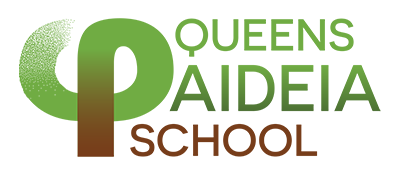Last night was our annual Parent Orientation. Having done this for almost 10 years, it may surprise some readers that we put a large, critical eye on it every year, as if it’s our first time. Just as we teach our students to ask and answer questions (and to write about them, persuade, support their arguments with evidence, etc.), we ask ourselves annually, “We’ve got their parents as captive listeners for two hours tonight–what do they really need to know?” We answer this question differently every year, because we have learned so much between last orientation and the current one.
 Our answer always harks back to the very beginning of Queens Paideia, when we asked ourselves, “What do children need to know?” The easiest thing for a school to do is lean in primarily on product, that is, activities and tangibles that can be sent home, hung up, and bragged about. Nothing to sneeze at; we like a wall full of impressive artwork, writings, and science projects as much as the next school. But we are also after process, and creating a holistic learning skill set that pervades all learning and is transferrable to new situations. That’s why you hear words like heuristics, fluency, and self-management bandied about QPS among our staff and students as much as you hear about projects, research papers, and papier-mâché.
Our answer always harks back to the very beginning of Queens Paideia, when we asked ourselves, “What do children need to know?” The easiest thing for a school to do is lean in primarily on product, that is, activities and tangibles that can be sent home, hung up, and bragged about. Nothing to sneeze at; we like a wall full of impressive artwork, writings, and science projects as much as the next school. But we are also after process, and creating a holistic learning skill set that pervades all learning and is transferrable to new situations. That’s why you hear words like heuristics, fluency, and self-management bandied about QPS among our staff and students as much as you hear about projects, research papers, and papier-mâché.
With this mind-set–product and process–as our starting point, last night we passed out a handout that describes some of the planned topics and outputs we are going after this year, and then we leaned in to discuss:
- Reading and writing–the mechanics for advancing in these areas and the necessity of practice and positive reinforcement and modeling for both.
- Social studies as a vehicle for developing thinking skills, for learning and practicing research and writing skills, and for seeing past yourself.
- The scientific method as a way of interacting with the world, be it understanding natural phenomena to puzzling through human behavior to approaching how to play an instrument or cook something new.
- The grounding of math in real-life contextualized experiences so that the symbolic and abstract become the concrete and, ultimately, the conceptual.
- The daily necessity of practicing self-management and social-emotional skills–using a planning tool, organizing your desk, articulating what upsets you in clear language, reflecting on how your day went…–so as to put all of that knowledge and hard-earned skills to good purpose and results.
 We were keen on sharing the framework we use at QPS, and to help parents appreciate their children’s output AND the steps they take to get there and what they learn along the way. We also conveyed the message that parents must learn and grow alongside their children, especially in the areas of patience and observation for small changes, and modeling social in-person openness in a world that increasingly discourages it.
We were keen on sharing the framework we use at QPS, and to help parents appreciate their children’s output AND the steps they take to get there and what they learn along the way. We also conveyed the message that parents must learn and grow alongside their children, especially in the areas of patience and observation for small changes, and modeling social in-person openness in a world that increasingly discourages it.
We look forward to another year of our learning, too, and how it will translate into next year’s Parent Orientation presentation.

